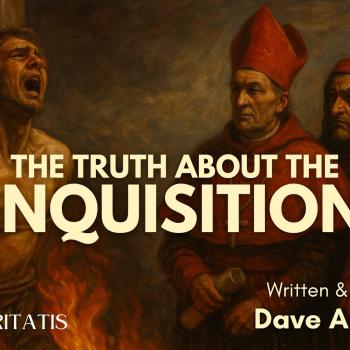
(11-30-07; expanded on 10-31-17)
***
The heroic, inspiring stories of St. Thomas More (1478-1535) and St. John Fisher (1469-1535; the only bishop in England who resisted Henry VIII’s tyranny and butcheries) are well known, so I won’t recount them here. Huldreich Zwingli (1484-1531) was Luther’s fellow Protestant “reformer”, who differed from him especially on the question of the nature of the Eucharist; holding to mere symbolism, whereas Luther accepted the Real (Substantial) Presence.
Protestant historian Philip Schaff has written about Luther’s hostility towards Zwingli:
His disgust with the radicalism and fanaticism of Carlstadt and Münzer, his increasing bodily infirmities, and his dissatisfaction with affairs in Wittenberg (which he threatened to leave permanently in 1544), cast a cloud over his declining years. He had so strongly committed himself, and was so firm in his convictions, that he was averse to all further changes and to all compromises. He was equally hostile to the Pope, whom he hated as the very antichrist, and to Zwingli, whom he regarded as little better than an infidel.
The deepest ground of Luther’s aversion to Zwingli must be sought in his mysticism and veneration for what he conceived to be the unbroken faith of the Church. He strikingly expressed this in his letter to Duke Albrecht of Prussia (which might easily be turned into a powerful argument against the Reformation itself). He went so far as to call Zwingli a non-Christian (Unchrist), and ten times worse than a papist (March, 1528, in his Great Confession on the Lords Supper). His personal interview with him at Marburg (October, 1529) produced no change, but rather intensified his dislike. He saw in the heroic death of Zwingli and the defeat of the Zurichers at Cappel (1531) a righteous judgment of God, and found fault with the victorious Papists for not exterminating his heresy (Wider etliche Rottengeister, Letter to Albrecht of Prussia, April, 1532, in De Wette’s edition of L. Briefe, Vol. IV. pp. 352, 353).
And even shortly before his death, unnecessarily offended by a new publication of Zwingli’s works, he renewed the eucharistic controversy in his Short Confession on the Lord’s Supper (1544, in Walch’s edition, Vol. XX. p. 2195), in which he abused Zwingli and Oecolampadius as heretics, liars, and murderers of souls, and calls the Reformed generally ‘eingeteufelte [ἐνδιαβολισθέντες], durchteufelte, überteufelte lästerliche Herzen und Lügenmäuler.’ No wonder that even the gentle Melanchthon called this a ‘most atrocious book,’ and gave up all hope for union (letter to Bullinger, Aug. 30, 1544, in Corp. Reform. Vol. V. p. 475: ‘Atrocissimum Lutheri scriptum, in quo bellum περὶ δείπνου κυριακοῦ instaurat;’ comp. also his letter to Bucer, Aug. 28, 1544, in Corp. Reform. Vol. V. p. 474, both quoted also by Gieseler, Vol. IV. p. 412, note 38, and p. 434, note 37). But it should in justice be added, first, that Luther’s heart was better than his temper, and, secondly, that he never said a word against Calvin; . . .”
(The Creeds of Christendom, Vol. I, 1877, revised by Philip Schaff: 5th edition in 1884; this is the 6th edition from 1931; Chapter Six, section 45; p. 260)
Here are some very telling excerpts from the aforementioned letter of Luther’s:
And recently God has notably punished the poor people of Switzerland, Zwingli and his followers, for they were hardened and perverted, condemned of themselves, as St. Paul says. They will all experience the same.
Although neither Munzerites nor Zwinglians will admit that they are punished by God, but give out that they are martyrs, nevertheless we, who know that they have gravely erred in the sacrament and other articles, recognize God’s punishment and beware of it ourselves. Not that we rejoice in their misfortune, which is and always has been a sorrow to our hearts, but we cannot let the witness of God pass unnoticed. We hope from the bottom of our hearts that they are saved, as it is not impossible for God to convert a man in a moment at his death; but to call them martyrs implies that they died for a certain divine faith, which they did not. We do not send criminals whom we execute to hell, but we do not for that reason make martyrs of them.
. . . We must believe that this is a chastisement of God, of which they cannot boast . . .
Wherefore I warn your Grace, and beg that you will avoid such people and not suffer them in your land. . . . for if you allow any to teach against the long and unanimously held doctrine of the Church when you can prevent it, it may well be called an unbearable burden to conscience. . . . For we must not trifle with the articles of faith so long and unanimously held by Christendom . . .
(Preserved Smith, The Life and Letters of Luther, Boston and New York: Houghton Mifflin Company, 1911, 291-292; letter from Wittenberg, “February or beginning of March, 1532)
Luther’s general thought on the question of execution of heretics was expressed in a statement from his Home-Postils in 1533:
[T]he worldly authorities bear the sword with orders to prevent all scandal, so that it may not enter and inflict harm. But the most dangerous and horrible scandal is where false doctrine and worship penetrates . . . They (i.e., State officials) must resist it (i.e., such scandal) stoutly, and realize that nothing else will avail save their use of the sword and of the full extent of their power in order to preserve the doctrine pure and the worship clean and undefiled.
(in Erasmus and Luther: Their Attitude to Toleration, Robert H. Murray, London: Society for Promoting Christian Knowledge, 1920, p. 274; documentation of German primary sources in the footnotes; parentheses in this work)
Thus, in accordance with this mentality of secular states executing persons because of their religious beliefs (and in light of his thought about Zwinglians and God’s judgment), we see his chilling reaction to the martyrdoms of St. Thomas More and St. John Fisher:
The fierceness of his zeal was blinding him increasingly. He rejoiced at the death of those rare spirits, Sir Thomas More and Bishop Fisher, in 1535. His joy arose in part from the circumstance that the latter had just been created a member of the Sacred College. “Oh, that our Right Reverend Cardinals, Popes and Roman Legates,” he wrote, “had more kings of England to destroy them.” (Ibid., p. 274)
This lovely sentiment was expressed in a letter to Philip Melanchthon in the beginning of December 1535. It is reprinted in Luther’s Works, Vol. 50: Letters III, 113-117. Luther opines (p. 115):
It is quite easy for someone who knows what kind of traitors, thiefs, robbers, and even devils the most reverend lord cardinals, popes, and their ambassadors are, to have second thoughts. I wish there would be more kings of England who would slay them.
Footnote 9 mentions the editor’s opinion that this statement might relate to St. John Fisher’s execution; cf. similar citation in Hartmann Grisar, Martin Luther: His Life and Work, Westminster, Maryland: Newman Press, 1950, p. 415; he provides some of the original Latin from primary source Briefwechsel, Vol. X, p. 275: “Utinam haberent plures reges Angliae, qui eos occiderent“. His version (translated from his German to English) is as follows:
One is apt to fly into a passion, when one realizes what traitors, thieves, murderers, yea, veritable devils the cardinals, popes, and their legates are. Would they had several kings of England to execute them.
The Catholic Encyclopedia describes St. John Fisher’s last days:
In June a special commission for Fisher’s trial was issued, and on 17 June he was arraigned in Westminster Hall on a charge of treason, in that he denied the king to be supreme head of the Church. Since he had been deprived of his bishopric by the Act of Attainder, he was treated as a commoner, and tried by jury. He was declared guilty, and condemned to be hanged, drawn, and quartered at Tyburn, but the mode of execution was changed, and instead he was beheaded on Tower Hill.
The martyr’s last moments were thoroughly in keeping with his previous life. He met death [on 22 June 1535] with a calm dignified courage which profoundly impressed all present. His headless body was stripped and left on the scaffold till evening, when it was thrown naked into a grave in the churchyard of Allhallows, Barking. Thence it was removed a fortnight later and laid beside that of Sir Thomas More in the church of St. Peter ad Vincula by the Tower. His head was stuck upon a pole on London Bridge, but its ruddy and lifelike appearance excited so much attention that, after a fortnight, it was thrown into the Thames, its place being taken by that of Sir Thomas More, whose martyrdom occurred on 6 July next following.
***
Photo credit: St. John Fisher, attributed to Peter Paul Rubens (1577-1640), after Hans Holbein the Younger (c. 1498-1543) [public domain / Wikimedia Commons]
***













